タゴール 世界詩聖 詩人 思想家 作曲家の多才な人生の軌跡と功績
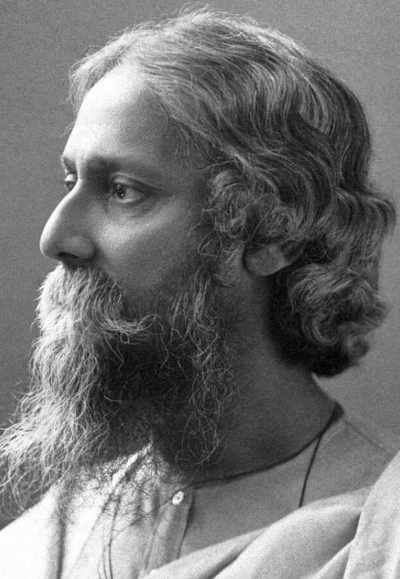
“The Trail and Achievements of Tagore: A Multifaceted Life of a World Poet, Philosopher, and Composer”
イントロダクション
ラビンドラナート・タゴール、その名はインドを超えて世界に響き渡る。
詩聖と讃えられる彼は、豊かな詩情を紡ぎ出す詩人であり、深遠な思索を巡らす思想家、そして心に響く旋律を生み出す作曲家でもあった。
この記事では、タゴールの多面的な才能が織り成す生涯と、彼が後世に残した数々の功績を辿る旅に出る。彼の足跡は、今もなお多くの人々に影響を与え続けている。
Introduction
Rabindranath Tagore—his name resonates beyond India and echoes throughout the world.
Celebrated as a poet laureate, he wove rich poetic verses, pondered profound thoughts as a philosopher, and composed melodies that touched the soul.
In this article, we embark on a journey through Tagore’s multifaceted talents that shaped his life, exploring the numerous achievements he left for posterity. His footsteps continue to inspire countless individuals to this day.
タゴールの世界:詩聖としての影響力
ラビンドラナート・タゴールは、1861年にインドのコルカタで生まれた多才な文化人です。
彼は詩、小説、劇、音楽、絵画など多岐にわたる分野で活躍し、インド文学と文化の発展に大きく貢献しました。
1913年にはアジア人として初めてノーベル文学賞を受賞し、国際的な評価を確固たるものにしました。
タゴールの作品は、その深い哲学的思索と美しい詩情によって、今もなお世界中の人々に愛され続けています。
インド国歌「ジャナ・ガナ・マナ」をはじめ、多くの楽曲の作詞・作曲も手がけた彼は、インド音楽の発展にも寄与しました。
その音楽は、インド独自の伝統と西洋音楽の要素が融合したユニークなスタイルを持ち、後の作曲家たちにも多大な影響を与えました。
思想家としてのタゴールは、教育改革や社会改善にも熱心でした。
彼は自らの私立学校を設立し、自由な精神と創造性を育む教育を推進。
また、カースト制度や宗教的偏見にも批判的であり、平等で開かれた社会を目指した彼の思想は、インド独立運動にも影響を与えました。
タゴールの世界は、彼の多才な才能と深遠な思想によって築かれたものであり、今日においてもその影響力は色褪せることがありません。
インドの詩人に留まらず、世界文学における詩聖としての地位を確立したタゴール。
その作品と生涯は、私たち現代人にも多くの示唆を与えてくれます。
タゴールの生涯とインド文学への貢献
ラビンドラナート・タゴールは、1861年にインドのコルカタで生まれた多才な芸術家であり、詩聖として広く尊敬されています。
彼は詩集『ギータンジャリ』で1913年にノーベル文学賞を受賞し、アジア人として初の受賞者となったことで知られています。
タゴールの作品は、詩だけに留まらず、小説、戯曲、音楽、絵画にも及び、インド文化と文学において重要な役割を果たしました。
タゴールの思想は、インドの独立運動や教育改革にも影響を与え、彼は自由主義と人間主義の理念を強く信じていました。
そのため、彼の作品には、人間の尊厳と自然への愛が強く表現されています。
また、彼はサンティニケタンにヴィシュヴァ・バーラティ大学を設立し、異文化間の対話と理解を深める場としての教育の重要性を説きました。
タゴールはまた、音楽の分野でも才能を発揮し、多くの歌曲を作曲しました。
彼の音楽はラバンドラ・サンギートとして知られ、今日でもインドやバングラデシュで親しまれています。
彼の音楽と文学の才能は、インドの文化的アイデンティティの形成に寄与し、インド国歌「ジャナ・ガナ・マナ」とバングラデシュ国歌「アマール・ソナール・バングラ」の作者としても記憶されています。
タゴールの生涯は、インドだけでなく世界文学においても大きな足跡を残しました。
彼の普遍的な思想と芸術的な貢献は、今日でも多くの人々に影響を与え続けています。
彼の作品は、人類の精神的な成長と文化的な豊かさを追求する旅を象徴しており、その遺産は永遠に継承されていくでしょう。
Tagore’s World: The Influence as a Poet Laureate
Rabindranath Tagore, born in 1861 in Kolkata, India, was a versatile intellectual and cultural icon.
Renowned as a poet laureate, he excelled across various fields including poetry, novels, drama, music, and painting, significantly contributing to the development of Indian literature and culture.
In 1913, he became the first Asian to win the Nobel Prize in Literature, solidifying his international acclaim.
Tagore’s works continue to be cherished worldwide for their profound philosophical insights and beautiful poetic expressions.
In addition to composing the Indian national anthem, “Jana Gana Mana,” he composed numerous other melodies that enriched Indian music.
His music blended elements of Indian traditions with Western influences, pioneering a unique style that influenced later composers.
As a philosopher, Tagore was passionate about educational reform and social improvement.
He founded his own private school promoting education that nurtured freedom of spirit and creativity.
Critically examining caste systems and religious biases, his vision aimed at fostering an egalitarian and open society, influencing the Indian independence movement.
Tagore’s world was shaped by his multifaceted talents and profound philosophies, maintaining enduring influence today.
Not confined to being merely an Indian poet, Tagore established himself as a poet laureate in world literature.
His works and life offer profound insights to contemporary audiences.
Tagore’s Life and Contributions to Indian Literature
Rabindranath Tagore, born in 1861 in Kolkata, India, was a versatile artist revered as a poet laureate.
He is widely respected for winning the Nobel Prize in Literature in 1913 for his poetry collection “Gitanjali,” becoming the first Asian laureate.
Tagore’s works spanned beyond poetry to include novels, plays, music, and painting, playing a pivotal role in Indian culture and literature.
His philosophy influenced India’s independence movement and educational reforms, advocating strongly for liberal and humanist ideals.
As a result, his works resonate with strong expressions of human dignity and love for nature.
He founded Vishva Bharati University in Santiniketan, emphasizing the importance of education as a platform for intercultural dialogue and understanding.
Tagore also showcased his musical talent, composing numerous songs known as Rabindra Sangeet, still beloved in India and Bangladesh today.
His contributions to music and literature helped shape India’s cultural identity, and he is remembered as the author of the Indian national anthem, “Jana Gana Mana,” and the Bangladeshi national anthem, “Amar Shonar Bangla.”
Tagore’s life left an indelible mark not only on Indian but also on world literature.
His universal ideas and artistic contributions continue to inspire many people today.
His works symbolize a journey toward humanity’s spiritual growth and cultural richness, ensuring his legacy endures eternally.
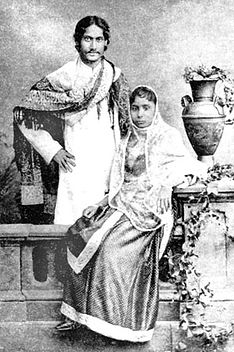
Mrinalini Devi and 1883
詩聖タゴールの思想とその普遍性
ラビンドラナート・タゴール、インドが輩出した偉大な詩人であり、思想家、作曲家でもあります。
彼は西ベンガルに生まれ、幼い頃から文学に親しんだ結果、多岐にわたる芸術分野で才能を発揮しました。
タゴールの名は、1913年にノーベル文学賞を受賞したことで世界的に知られるようになり、彼の作品は多くの言語に翻訳されています。
タゴールの影響力は、詩作だけに留まりません。
彼はインド国歌「ジャナ・ガナ・マナ」の作詞・作曲を手がけるなど、国民的な作曲家としてもその名を残しています。
また、彼の思想は普遍的な価値を持ち、自由と人間の尊厳を重んじるメッセージが込められています。
詩聖と呼ばれるタゴールは、インドだけでなく世界中の文学愛好家から尊敬を集めています。
彼の思想は時代を超えて多くの人々に影響を与え、今なお多くの人の心に響く普遍的なメッセージを持っています。
タゴールが残した豊かな遺産は、現代においても新しい創造性を刺激し続けており、その価値は計り知れません。
The Universal Philosophy of Poet Laureate Tagore
Rabindranath Tagore, a great poet, philosopher, and composer hailing from West Bengal, India, demonstrated his talents across various artistic disciplines from a young age due to his early immersion in literature.
Tagore became internationally renowned when he was awarded the Nobel Prize in Literature in 1913, and his works have been translated into numerous languages.
His influence extends beyond poetry alone. Tagore is also remembered as a national composer for his composition and lyrics of the Indian national anthem, “Jana Gana Mana.”
His philosophy espouses universal values, emphasizing freedom and human dignity.
Tagore, known as the poet laureate, commands respect not only from India but also from literary enthusiasts worldwide.
His thoughts continue to influence people across generations, resonating with a timeless message that holds significance even today.
Tagore’s rich legacy continues to inspire new creativity in the contemporary world, underscoring its immeasurable value.
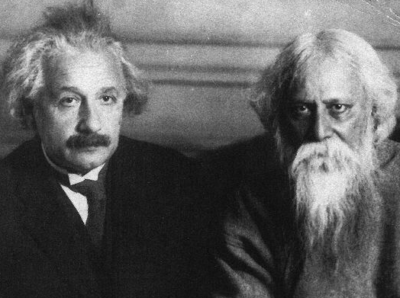
Einstein and Tagore (1930)
タゴールの詩人としての側面
ラビンドラナート・タゴールは、インドを代表する詩人であり、その創作活動は詩聖として世界に称賛されています。
彼の詩は、深い哲学的思索と繊細な感性が織りなす、独特のリズムと響きを持っています。
代表作である『ギータンジャリ』は、精神性と自然への讃歌が融合した作品として知られ、1913年にはノーベル文学賞を受賞しました。
この受賞は、アジア人として初めての快挙であり、タゴールの国際的な地位を不動のものにしました。
タゴールの詩には、インドの伝統的な音楽や詩の形式が取り入れられており、彼自身も作曲家として多くの曲を残しています。
これらの楽曲は、今もなおインド各地で愛唱され、インドの文化的アイデンティティを形作る一部となっています。
また、思想家としても知られるタゴールは、人間の自由や平等、愛といった普遍的な価値を詩を通じて訴え、多くの人々に影響を与えました。
彼の詩からは、人生における喜びや悲しみ、そしてそれらを受け入れる広い心と深い理解が感じられます。
タゴールは、人生の様々な局面を経験しながらも、常に内面の光を失わずに創作を続けたことで、後世に多大な影響を与える詩人としての側面を持っています。
彼の作品は、単なる文字の羅列ではなく、生きた哲学であり、読む者の心に深く響くメッセージを持っています。
タゴールの代表作と詩の特徴
ラビンドラナート・タゴールは、ベンガル地方を起源とするインドの詩人であり、詩聖として世界的に称賛されています。
彼の創作活動は詩に留まらず、思想家、作曲家としても知られ、その多才ぶりはインドの文化や教育に多大な影響を与えました。
タゴールの代表作には、『ギータンジャリ』があり、この作品で彼は1913年にノーベル文学賞を受賞しました。
詩集は、神への深い瞑想と自然への愛を融合させた内容で、タゴールの詩の特徴である宗教的かつ神秘的な要素が色濃く表れています。
タゴールの詩は、自由な韻律とリズムを持ち、伝統的な詩形にとらわれない独自性があります。
彼の詩の中には、人間と自然との一体感や、普遍的な愛と絆の重要性が歌われており、これらのテーマはタゴールの人生観と密接に関連しています。
彼は、人間の内面世界と外部世界との調和を重んじ、その思想は彼の詩に反映されています。
タゴールの詩における言語の使用は、彼の詩人としての技巧を示しており、簡潔かつ力強い言葉で深い感情や思索を表現しています。
彼の詩は、ベンガル語のみならず、英語に翻訳され世界中で読まれていることから、インドの詩人としての彼の普遍的な魅力がうかがえます。
タゴールの作品は、今日でも多くの人々に読まれ、彼の思想と芸術的才能は、インドはもちろん世界中の文学と音楽において重要な位置を占めています。
彼の詩は、読む人の心に深く響き、インドの文化遺産として、また普遍的な人間の感情を表現する手段として、その価値を今後も保ち続けるでしょう。
詩から読み解くタゴールの人生観
ラビンドラナート・タゴールは、インドの詩人であり、その創造性と深い洞察力により「詩聖」として世界的な称賛を集めました。
彼の人生観は、彼の詩作品を通じて多くの人々に影響を与え続けています。
タゴールの詩は、彼自身の哲学的思考とインドの霊的伝統に根ざしており、自然との調和、愛、自由に対する深い敬意が表現されています。
代表作として知られる『ギータンジャリ』は、神との対話を詠んだ詩集であり、1913年にはノーベル文学賞を受賞しています。
この作品では、タゴールは宇宙の美しさと人間の内面世界の探求を織り交ぜながら、普遍的な真理を探求しました。
彼の詩は、単なる文字の集まりを超え、魂の歌として読者に響きます。
タゴールの詩には、人間と自然、人間と神、人間同士の関係性を探るテーマが頻繁に見られます。
彼は、人生の真実を明らかにし、読者が自己実現への道を見出すための手がかりを提供しています。
タゴールの人生観は、個人の内面の発展と社会的な進歩の両方を重視するものであり、その思想は今日でも多くの人々にとって価値あるものとなっています。
さらに、タゴールは思想家であり、作曲家でもありました。
彼の音楽と詩は、インド文化における重要な要素として、今日も多くの人々に愛され続けています。
彼の作品は、インドだけでなく世界中で読まれ、彼の普遍的なメッセージは国境を超えて共感を呼んでいます。
タゴールの詩からは、彼が追求した人生観が明確に伝わってきます。
それは、愛と尊敬に基づく人間関係、自然との調和、そして精神的な目覚めへの渇望を含んでいます。
彼の作品を読むことで、私たちは人間としての経験の豊かさを再発見し、より深い自己理解に至ることができるのです。
The Poetic Aspect of Tagore
Rabindranath Tagore, India’s revered poet, is acclaimed worldwide for his creative prowess as a poet laureate.
His poetry resonates with profound philosophical reflections and delicate sensibilities, woven into a unique rhythm and resonance.
His magnum opus, “Gitanjali,” blends spirituality with praise for nature and earned him the Nobel Prize in Literature in 1913, marking a historic achievement as the first Asian to receive this honor.
Tagore’s influence extends beyond poetry alone.
He is renowned as a national composer for his composition and lyrics of India’s national anthem, “Jana Gana Mana.”
Tagore’s philosophy embodies universal values, emphasizing freedom, human dignity, and love through his poetry.
Esteemed as a poet laureate, Tagore commands respect not only in India but also among literary enthusiasts worldwide.
His philosophy continues to resonate with many, carrying timeless messages that touch the hearts of people today.
Tagore’s rich legacy stimulates contemporary creativity and holds immeasurable value.
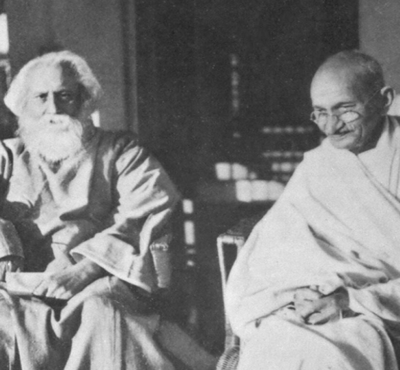
Tagore and Gandhi (1940)
タゴールの思想家としての立場
タゴールは、インドの文化と思想の発展に大きな足跡を残した人物です。
彼は詩聖としての名声を超え、教育者、社会改革者、そして思想家として多くの偉業を成し遂げました。
特に教育への深い情熱は、シャンティニケタンの設立に結実しました。
この施設は、単なる学校以上のものであり、タゴールの理念が具現化した場所として知られています。
彼は、教育を通じて人間の内面的な成長を促し、個人の創造性を重んじるカリキュラムを提供しました。
さらに、タゴールは社会改革への取り組みも積極的に行いました。
彼はカースト制度の撤廃や女性の地位向上など、当時のインド社会に根強く残る問題に対して、言葉と行動で変革を促しました。
彼の思想は、インドのみならず世界中に影響を与え、多くの人々にインスピレーションを与え続けています。
タゴールの作曲家としての才能も、彼の多面的な才能を示しています。
彼は国歌「ジャナ・ガナ・マナ」と「アマール・ソナール・バングラ」を作曲し、インドとバングラデシュの国民に愛され続けています。
彼の音楽は、彼の詩と同様に、深い哲学的意味を持ち、人々の心に響くメッセージを伝えています。
タゴールの思想家としての立場は、彼の生涯を通じて表現された普遍的な価値観と、人類への深い愛情に根ざしています。
彼の教育への貢献と社会改革への努力は、今日でも多くの人々にとって大きな意味を持ち続けており、彼の遺した思想は未来に向けても価値ある遺産として受け継がれていくでしょう。
教育への情熱とシャンティニケタンの設立
ラビンドラナート・タゴールは、インドを代表する詩人であり、教育者、思想家、そして作曲家としても知られています。
彼の教育に対する深い情熱は、シャンティニケタンの設立に結実しました。
この施設は、伝統的な教育システムに対する彼の革新的な考えを体現しており、教育を通じて社会改革を実現しようとするタゴールの理念が反映されています。
タゴールは、教育が単に知識の伝達ではなく、生徒の創造性と自立心を育むプロセスであると考えました。
シャンティニケタンでは、自然に囲まれた環境の中で、芸術、文化、哲学に触れながら、生徒たちが自由に学び、成長することを重視しました。
こうした教育理念は、当時のインドの社会に新たな風を吹き込み、教育を通じた社会改革への道を開いたのです。
また、タゴールはインドの詩聖としても称えられ、彼の詩や音楽は今なお多くの人々に愛されています。
彼の作品には、人間と自然との調和、平和と博愛の精神が込められており、それはシャンティニケタンの校風にも反映されています。
タゴールの思想は、インドのみならず世界中の教育と文化に影響を与え続けており、その遺産は今日に至るまで尊重されています。
教育への情熱とシャンティニケタンの設立は、タゴールの多面的な才能と深い人間愛に根ざしたものであり、それは彼が残した詩や音楽と同様に、永遠の価値を持つものです。
彼の生涯と業績は、インドのみならず世界の教育と文化の歴史において、重要な一章を形成しています。
社会改革への取り組みとその影響
ラビンドラナート・タゴールは、インドの詩人であり思想家、作曲家としても知られ、ノーベル文学賞を受賞した最初のアジア人です。
彼はタゴール家に生まれ、その家族はヒンドゥー教改革運動に深く関わっていました。
タゴールの社会に対する影響は、教育と社会改革に対する彼の情熱からも見て取れます。
彼の教育への情熱は、シャンティニケタンの設立に結実しました。
この学校は、自由な精神のもとで学び、多様な文化が交わる場として設計されました。
タゴールは、教育を通じて社会の変革を促し、固定された教育制度に疑問を投げかけました。
タゴールはまた、詩聖としても讃えられ、彼の詩はインドだけでなく世界中に影響を与えました。
彼の作品は、バングラデシュ国歌をはじめ、多くの歌にも採用されています。
タゴールの思想は、社会の階層制度や不平等に挑戦し、より公平で平和な社会を目指す動機となりました。
彼の社会改革への取り組みは、特に女性の地位向上や貧困層の教育へのアクセス改善に焦点を当てました。
タゴールの影響は今日に至るまで続いており、彼の理念と行動は多くの人々にとって刺激となっています。
彼の遺した思想家としての遺産は、インドはもちろん、世界中の社会改革の指針となっています。
Tagore’s Position as a Philosopher
Rabindranath Tagore left a profound mark on the development of Indian culture and thought. Beyond his renown as a poet, he achieved many great feats as an educator, social reformer, and philosopher.
His deep passion for education culminated in the establishment of Shantiniketan. This institution, more than just a school, became a physical embodiment of Tagore’s ideals. Through education, he aimed to foster inner growth in individuals and emphasized a curriculum that valued creativity.
Furthermore, Tagore actively engaged in social reform. He used his words and actions to advocate for the abolition of the caste system and the advancement of women’s rights, addressing persistent issues in Indian society at the time.
His philosophy transcended India, influencing people worldwide and continuing to inspire many. Tagore’s talents extended to composing music, including the national anthems of India (“Jana Gana Mana”) and Bangladesh (“Amar Shonar Bangla”), which remain beloved by their respective nations.
Tagore’s position as a philosopher was rooted in universal values expressed throughout his lifetime and a deep affection for humanity. His contributions to education and efforts towards social reform remain profoundly meaningful to many today, ensuring that his legacy of thought will endure as a valuable heritage for the future.
タゴールの作曲家としての才能
ラビンドラナート・タゴールは、詩聖としての地位を確立したインドの詩人であり、思想家、そして作曲家としてもその才能を発揮しました。
彼の楽曲はインド文化に深い影響を与え、今日に至るまで多くの人々に愛され続けています。
タゴールの音楽は、彼が創設したタゴール国際大学であるシャンティニケタンで重要な教育資源となっており、カルカッタを中心にインド全土で親しまれています。
タゴールが作曲した楽曲は、その独特の魅力で知られています。
彼の音楽は、インドの伝統的なラーガに基づきつつも、西洋音楽の影響を取り入れた斬新なスタイルを生み出しました。
特に、インド国歌「ジャナ・ガナ・マナ」とバングラデシュ国歌「アマール・ソナール・バングラ」は、タゴールの作曲家としての才能を象徴する作品であり、彼の名を世界に知らしめることになりました。
彼の音楽は、単なる芸術作品以上のものを提供しています。
タゴールの楽曲は、インドの民族主義や独立への渇望を表現し、人々の心を一つに結びつける力を持っています。
ノーベル文学賞を受賞した彼の文学作品と同様に、音楽もまた、タゴールの深い思索と豊かな感性を反映しています。
タゴールの作曲家としての才能は、彼の多面的な才能の一端に過ぎませんが、インド音楽の歴史において重要な役割を果たし、後世に多大な影響を与えるものとなりました。
彼の音楽は、インドだけでなく世界中の人々に感動を与え続けています。
タゴールの音楽とインド文化への影響
ラビンドラナート・タゴールは、インド文化において多面的な才能を発揮した人物です。
詩聖として知られ、ノーベル文学賞を受賞した彼は、インドの詩人でありながら、思想家、作曲家としても大きな足跡を残しました。
彼の作曲した楽曲は、インド国歌としても採用され、その影響力は計り知れません。
タゴールの音楽は、ベンガル州の文化的背景を色濃く反映しています。
ダルカナート・タゴールの孫として生まれた彼は、幼少期から豊かな芸術環境に触れ、独自の音楽スタイルを確立しました。
タゴール国際大学(現在のヴィシュヴァ・バーラティ大学)を設立し、教育と芸術の融合を図ることで、インド文化への貢献を深めたのです。
彼の楽曲には、インド古典音楽の伝統と西洋音楽の要素が巧みに組み合わさっており、その独特の魅力は今も多くの人々を魅了して止みません。
タゴールの音楽とインド文化との関係は、単に楽曲が生まれた背景を超え、インド人のアイデンティティと深く結びついていると言えるでしょう。
彼の遺した音楽的遺産は、インドだけでなく世界中の文化にも影響を与え続けています。
タゴールの楽曲が持つ独特の魅力
タゴールは、インドの詩人であり思想家、そして才能あふれる作曲家でもありました。
彼の楽曲は、インド文化に深く根差し、その独特の魅力は今なお世界中で愛され続けています。
タゴールが作曲した数々の曲は、カルカッタでの彼の生活やバウルの音楽に影響を受け、インド国歌やバングラデシュ国歌としても採用されるほど、国民に愛される作品となりました。
彼の音楽は、単なるメロディ以上のものを持っています。
タゴールの楽曲は、彼の哲学的思想や詩的な美しさを音楽という形で表現しており、聴く者に深い感動を与えます。
ノーベル文学賞を受賞するほどの文学的才能を持つタゴールが、楽曲に込めた情緒は、聴く者の心に響き、時として彼らを異なる時代や場所へと誘います。
タゴールの楽曲が持つ独特の魅力は、彼の深い内省とインドの伝統的な音楽スタイルの融合にあります。
彼の音楽は、伝統と革新のバランスを見事に保ちながら、聴く者に新鮮な感覚を提供します。
それは、タゴールがインド文化と世界の文化を繋ぐ架け橋となる作品を創り出したからこそ成し得ることでした。
タゴールの楽曲は、その独特な魅力と普遍性により、今日に至るまで多くの人々に愛され続けています。
彼の音楽は、インドのみならず世界の文化遺産として、その価値を永遠に留めるでしょう。
Tagore’s Talent as a Composer
Rabindranath Tagore, renowned as India’s poet laureate, also demonstrated his talent as a philosopher and composer.
His musical compositions have deeply influenced Indian culture and continue to be beloved by many today.
Tagore’s music serves as a significant educational resource at Tagore International University, formerly known as Shantiniketan, and is cherished across India, particularly in Kolkata.
Known for its unique charm, Tagore’s music blends elements of Indian classical ragas with innovative styles influenced by Western music.
Notably, his compositions of the Indian national anthem, “Jana Gana Mana,” and the Bangladeshi national anthem, “Amar Shonar Bangla,” symbolize his prowess as a composer, elevating his name worldwide.
Tagore’s music offers more than mere artistic expression. It resonates with themes of Indian nationalism, aspirations for independence, and unifying people’s hearts.
Like his Nobel Prize-winning literary works, Tagore’s music reflects his profound contemplation and rich sensibility.
While his role as a composer is just one facet of his multifaceted talent, it has played a crucial role in the history of Indian music, influencing future generations profoundly.
Tagore’s music continues to inspire people worldwide, maintaining its unique allure and profound impact on Indian culture.
The Unique Charm of Tagore’s Music
Tagore, celebrated as a poet and philosopher, also distinguished himself as a talented composer deeply rooted in Indian culture.
His compositions, which bear the imprint of Bengal’s cultural milieu, were influenced by his upbringing in a rich artistic environment and established his distinct musical style.
By founding Tagore International University (now Vishva-Bharati University), he deepened his contribution to Indian culture by integrating education and the arts.
His music skillfully blends elements of Indian classical music tradition with Western influences, captivating listeners with its unique charm that continues to resonate worldwide.
Tagore’s music goes beyond mere melody. It encapsulates his philosophical thoughts and poetic beauty in musical form, evoking deep emotions in listeners.
The emotional depth infused in Tagore’s compositions, by a literary genius honored with the Nobel Prize, invites listeners on a journey through different times and places.
The unique charm of Tagore’s music lies in its fusion of his profound introspection with traditional Indian musical styles.
Maintaining a delicate balance between tradition and innovation, Tagore’s music offers listeners a fresh sensory experience.
His compositions serve as a bridge connecting Indian culture with global cultural heritage, ensuring their enduring value as part of world cultural heritage.
Tagore’s music, with its distinct allure and universal appeal, continues to be cherished by people worldwide, solidifying its place as an invaluable part of global cultural legacy.
タゴールと日本との深い絆
ラビンドラナート・タゴールは、インドの詩人であり思想家、作曲家としても知られていますが、彼の影響は日本にも及んでいます。
彼が初めて日本を訪れたのは1916年で、その後も何度か日本を訪れる中で、日本文化への深い敬愛を示しました。
日本の美術や文学、哲学に対する理解と愛情は、彼の作品にも色濃く反映されています。
タゴールは、1913年にアジア人として初めてノーベル文学賞を受賞しました。
これは、東西の架け橋となる彼の文学的・思想的な貢献を世界が認めた瞬間であり、インドと日本の文化的な絆を強化する契機ともなりました。
彼の詩や楽曲は、バングラデシュ国歌をはじめ多くの国で愛されています。
タゴールの日本訪問は、日本人著名人との交流の場でもありました。
彼は多くの日本の知識人、芸術家と意見を交わし、相互の理解を深めることに貢献しました。
また、カルカッタにあるタゴール国際大学では、日本を含む世界各国からの学生が集い、タゴールの理念に学ぶことができます。
タゴールと日本との深い絆は、彼の文学作品や音楽、そして彼自身の人間性によって築かれました。
彼の普遍的なメッセージは、今日でも多くの人々に感銘を与え続けています。
Deep Bonds between Tagore and Japan
Rabindranath Tagore, renowned as a poet, philosopher, and composer from India, also left a significant impact on Japan.
His first visit to Japan was in 1916, and through subsequent visits, he demonstrated a profound admiration for Japanese culture.
His understanding and affection for Japanese art, literature, and philosophy are vividly reflected in his works.
In 1913, Tagore became the first Asian to win the Nobel Prize in Literature, a moment that recognized his literary and philosophical contributions as a bridge between East and West, thereby strengthening cultural ties between India and Japan.
His poems and music, including the national anthem of Bangladesh, are cherished in many countries.
Tagore’s visits to Japan provided opportunities for exchanges with prominent Japanese figures.
He engaged in discussions with numerous Japanese intellectuals and artists, contributing to mutual understanding between cultures.
Furthermore, at Tagore International University in Kolkata, students from around the world, including Japan, gather to study Tagore’s philosophy.
The deep bonds between Tagore and Japan were forged through his literary works, music, and his own personal ethos.
His universal message continues to inspire countless individuals to this day.
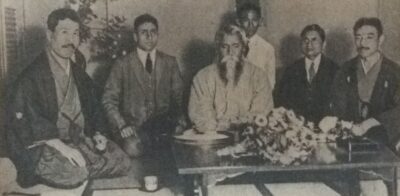
Tagore during his Visit to Japan in 1916, with Yokoyama Taikan on the right
日本への訪問と日本文化への敬愛
ラビンドラナート・タゴールは、インドの詩人であり思想家、作曲家としても知られていますが、彼の影響はインド国境を越え、日本にも及びました。
彼はノーベル文学賞を受賞した初のアジア人として歴史に名を刻み、その功績はタゴール国際大学の設立にも影響を与えています。
彼の思想はブラフモ・サマージの教えにも根ざしており、ベンガル州をはじめとするインドの文化に深い痕跡を残しています。
タゴールは1902年と1916年の二度にわたり日本を訪れ、日本文化への深い敬愛を示しました。
彼は日本の美術、文学、哲学に触れ、日本人の生活様式や精神性に感銘を受けたことを多くの著作で述べています。
彼の作品には、日本の自然や文化に対する賛美が込められており、インド国歌の作詞作曲者としても知られるタゴールは、日本との文化的な架け橋を築いた人物として尊敬されています。
また、タゴールは多くの日本人著名人とも交流を持ち、彼らとの対話を通じて両国間の文化的な理解を深めることに貢献しました。
彼の訪日経験は、インドと日本との友好関係の基盤を築く重要な役割を果たし、その足跡は今日においても多くの人々によって称賛されています。
タゴールの日本への訪問と日本文化への深い敬愛は、彼の作品を通じて、また彼が残した文化的遺産を通じて、後世に永く語り継がれることでしょう。
タゴールと日本人著名人との交流
ラビンドラナート・タゴールは、インドの詩人であり、思想家、作曲家としても知られています。
彼の影響はインド国内にとどまらず、世界中に及びました。
その中でも特に、日本との関係は深いものがあります。
タゴールは1916年と1924年、二度にわたり日本を訪れ、日本文化と日本人著名人との交流を深めました。
彼は日本の美術、文学、哲学に深い敬愛の念を抱いており、多くの日本人知識人と意見を交わし、互いに影響を与え合いました。
タゴールが日本で交流を持った著名人には、哲学者の岡倉天心や詩人の与謝野晶子などがいます。
彼らはタゴールの思想や文学作品に感銘を受け、それぞれの分野での創作活動においてタゴールの影響を受けたとされています。
また、タゴールはノーベル文学賞を受賞した最初のアジア人であり、その評価は日本においても高く、彼の訪日は大きな注目を集めました。
彼の業績はインド国歌およびバングラデシュ国歌の制作にも及び、彼の音楽的才能は国境を超えて讃えられています。
タゴールの生まれ故郷であるカルカッタ、ベンガル州は彼の文化的遺産を今も大切に保持しており、タゴール国際大学は彼の名を冠し、彼の教育理念を今日に伝えています。
タゴールと日本人著名人との交流は、文化や芸術の垣根を越えた深い絆を築き、日本とインドの相互理解と友好の促進に大きく寄与しました。
彼の普遍的な思想と芸術は、今なお世界中の人々に影響を与え続けています。
Tagore’s Visits to Japan and His Reverence for Japanese Culture
Rabindranath Tagore, known as a poet, philosopher, and composer from India, extended his influence beyond Indian borders to Japan.
Being the first Asian to win the Nobel Prize in Literature in 1913, his achievements also impacted the establishment of Tagore International University.
Rooted in the teachings of Brahmo Samaj, his philosophies left profound marks on Indian culture, particularly in Bengal.
Tagore visited Japan twice, in 1902 and 1916, demonstrating deep admiration for Japanese art, literature, and philosophy.
His works often praise Japanese nature and culture, and as the composer of the Indian national anthem, Tagore is revered as a cultural bridge-builder with Japan.
Moreover, Tagore engaged with numerous prominent Japanese intellectuals and artists, contributing to mutual cultural understanding through dialogue.
His visits played a crucial role in laying the foundation for Indo-Japanese friendship, continuing to be celebrated by many today.
Tagore’s visits to Japan and his profound admiration for Japanese culture will undoubtedly be perpetuated through his works and cultural legacy, resonating with future generations.
Exchange Between Tagore and Prominent Japanese Figures
Rabindranath Tagore is renowned as a poet, philosopher, and composer from India whose influence transcended national boundaries to reach global significance.
Notably, his relationship with Japan stands out.
Tagore visited Japan in 1916 and 1924, deepening his interactions with Japanese culture and prominent figures.
He held deep admiration for Japanese art, literature, and philosophy, engaging in discussions with many Japanese intellectuals, mutually influencing each other.
Among the notable Japanese figures Tagore interacted with were philosopher Okakura Tenshin and poet Yosano Akiko.
They were deeply moved by Tagore’s ideas and literary works, influencing their own creative pursuits in their respective fields.
Furthermore, Tagore was the first Asian to receive the Nobel Prize in Literature, earning high esteem in Japan, where his visits garnered significant attention.
His contributions extended to composing the national anthems of India and Bangladesh, with his musical talents praised beyond borders.
Tagore’s hometown of Kolkata, in the state of Bengal, continues to cherish his cultural legacy, with Tagore International University preserving his educational ideals today.
The exchange between Tagore and prominent Japanese figures forged a deep bond beyond cultural and artistic barriers, significantly contributing to mutual understanding and friendship between Japan and India.
His universal ideals and artistic contributions continue to influence people worldwide to this day.
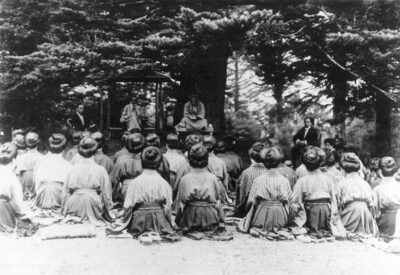
Tagore Conducting Meditation Guidance for Students in Karuizawa During His Visit to Japan in 1916ル
タゴールの作品とその翻訳
ラビンドラナート・タゴールは、インドの詩人であり、思想家、作曲家としてもその名を馳せています。
彼の著作は、インドだけでなく世界中で読まれ、多くが日本語を含む様々な言語に翻訳されています。
タゴールが1913年に受賞したノーベル文学賞は、アジア人として初の快挙であり、彼の作品が持つ普遍的な価値を世界に示しました。
彼の生まれ故郷であるカルカッタは、ベンガル州に位置し、タゴールの精神的な遺産を色濃く残しています。
彼はまた、インド国歌「ジャナ・ガナ・マナ」やバングラデシュ国歌「アマール・ソナール・バングラ」の作詞・作曲を手掛けるなど、国民的な作曲家としても知られています。
タゴール国際大学は彼の名を冠し、彼の教育に対する思想を今に伝えています。
タゴールの著作リストには、詩集『ギータンジャリ』や彼の自伝的小説『自分の履歴書』などがあります。
これらの作品は日本語に翻訳され、日本の読者にも親しまれています。
タゴール作品の読み解きでは、彼の深い哲学的思索と、豊かな自然や人間愛に対する彼の繊細な感性が光ります。
彼の作品は単なる文学作品を超え、人々に生きる智慧と勇気を与え続けているのです。
タゴールの著作リストと日本語訳の紹介
ラビンドラナート・タゴールはインドの詩人であり、詩聖としても知られています。
彼はノーベル文学賞を受賞した最初のアジア人であり、その作品は今なお世界中で愛されています。
タゴールの著作は多岐にわたり、インド国歌「ジャナ・ガナ・マナ」やバングラデシュ国歌「アマール・ソナール・バングラ」の作詞作曲も彼の手によるものです。
彼の思想と芸術への貢献は、カルカッタにあるタゴール国際大学で今も研究されています。
タゴールの著作リストには、詩集、小説、戯曲、エッセイが含まれ、彼の深い思索と豊かな想像力が表現されています。
これらの作品は多くが日本語に翻訳され、日本でも彼の哲学や文学的才能を理解しやすくなっています。
タゴール作品の読み解きは、インドの文化や哲学に触れる貴重な機会を提供し、彼の作品に込められた普遍的なメッセージは今日の読者にも響きます。
インドの詩人としての彼の地位は、世界文学における重要な位置を占めており、作曲家としても彼の楽曲はインドの音楽に大きな影響を与えました。
タゴールの著作リストとそれらの日本語訳を紹介することで、彼の多面的な才能と彼が残した遺産の価値を再認識することができるでしょう。
タゴール作品の読み解きとその魅力
タゴールは、インドの詩人であり、思想家、作曲家としても知られています。
彼の作品は、深い哲学的思索と豊かな感情表現が特徴で、多くの読者を魅了してきました。
タゴールはノーベル文学賞を受賞しており、その文学的才能は世界中で高く評価されています。
彼の詩は、カルカッタにあるタゴール家で育まれた独自の文化的背景を反映しており、ベンガル州の自然や人々の生活が色濃く描かれています。
また、タゴールはインド国歌とバングラデシュ国歌を作曲したことでも知られており、その音楽的な才能も非常に高いものがあります。
タゴールの作品は世界中で翻訳され、国際的な読者にも広く読まれています。
その中でも、タゴール国際大学では彼の思想や作品に関する研究が行われており、タゴール作品の読み解きとその魅力を深く掘り下げることができます。
タゴールの著作リストは多岐にわたり、詩集だけでなく、小説、戯曲、エッセイなど、多様なジャンルで彼の才能が発揮されています。
日本語訳も多数存在し、日本の読者にも親しまれています。
彼の作品を読むことで、インドの詩聖と称されるタゴールの深い精神性と、普遍的な人間愛を感じ取ることができるでしょう。
Tagore’s Works and Their Translations
Rabindranath Tagore is renowned as a poet, philosopher, and composer from India whose influence extends far beyond its borders.
His writings are read not only in India but also translated into various languages worldwide, including Japanese.
Tagore’s historic achievement in winning the Nobel Prize in Literature in 1913 as the first Asian marked the universal value of his works to the world.
His birthplace, Kolkata, located in the state of Bengal, profoundly preserves Tagore’s spiritual legacy.
He is also known as the composer of the Indian national anthem “Jana Gana Mana” and the Bangladeshi national anthem “Amar Shonar Bangla.”
Tagore International University bears his name and continues to propagate his educational philosophies.
Tagore’s literary repertoire includes poetry collections like “Gitanjali” and autobiographical novels such as “My Reminiscences.”
These works have been translated into Japanese and embraced by readers in Japan.
Interpreting Tagore’s works reveals his profound philosophical contemplations and delicate sensibility towards nature and humanity.
His works transcend mere literary pieces, continually imparting wisdom and courage to people.
Introducing Tagore’s Works and Their Japanese Translations
Rabindranath Tagore is an Indian poet known as the Bard of Bengal.
He was the first Asian to win the Nobel Prize in Literature, and his works continue to be beloved worldwide.
Tagore’s writings span a wide range, including composing the Indian national anthem “Jana Gana Mana” and the Bangladeshi national anthem “Amar Shonar Bangla.”
His contributions to thought and art are still studied at Tagore International University in Kolkata.
Tagore’s literary catalog includes poetry, novels, plays, and essays, expressing his profound reflections and rich imagination.
Many of these works have been translated into Japanese, making Tagore’s philosophical and literary talents accessible to Japanese readers.
Exploring Tagore’s works provides a valuable opportunity to engage with Indian culture and philosophy, resonating with universal messages that continue to captivate readers today.
The Impact and Charm of Tagore’s Works
Tagore is celebrated as an Indian poet, philosopher, and composer.
His works are distinguished by deep philosophical insights and rich emotional expressions that have captivated numerous readers.
Recipient of the Nobel Prize in Literature, Tagore’s literary talent is highly esteemed globally.
His poetry reflects the cultural backdrop nurtured within the Tagore household in Kolkata, vividly depicting the nature and lives of people in Bengal.
Moreover, Tagore’s musical talent is evident in his compositions of the Indian national anthem and the Bangladeshi national anthem.
Tagore’s works have been translated and widely read across the world, demonstrating international appreciation.
At Tagore International University, research continues to delve into his philosophies and works, offering deeper insights into their charm.
Spanning poetry, novels, plays, and essays, Tagore’s literary repertoire showcases his versatility across various genres.
With numerous translations available in Japanese, his works are well-loved by readers in Japan.
Reading Tagore’s works allows one to experience the profound spirituality of this revered Indian poet and grasp the universal love for humanity he expressed.
タゴールに関連する書籍・映画
ラビンドラナート・タゴールはインドの詩人であり、文学的業績によりノーベル文学賞を受賞した初のアジア人です。
彼の作品は、詩、小説、劇、エッセイに及び、インド国歌の作詞作曲も手掛けました。
タゴールに関する書籍と映画は、彼の多才な創造性と深い思想を伝える重要な資料です。
タゴールの生涯を描いた映画とドキュメンタリーは、カルカッタの文化的背景とベンガル州の伝統を反映しています。
彼の哲学的思考とバウルの歌に影響を受けた音楽性が、これらの作品を通じて視覚化されています。
特に、彼の人生と業績を描いた映画「タゴールの歌」は、タゴールの精神的遺産を深く掘り下げています。
タゴール研究のための推薦図書には、タゴール国際大学の研究者による論文集や伝記が含まれます。
これらの図書は、タゴールの文学的偉業と彼の思想の複雑さを理解するための貴重な情報源となっています。
研究者や学生だけでなく、タゴールの作品に興味を持つ一般読者にもお勧めの書籍が多数存在します。
タゴールの生涯を描いた映画とドキュメンタリー
ラビンドラナート・タゴールは、インドの詩人、思想家、作曲家であり、その多才な才能は世界中で称賛されています。
彼はノーベル文学賞を受賞した最初の非ヨーロッパ人として知られ、その受賞作品「ギータンジャリ」は今なお多くの人々に愛されています。
タゴールの生涯は、彼が創立したシャンティニケタンでの教育活動や、インド国歌「ジャナ・ガナ・マナ」とバングラデシュ国歌「Amar Sonar Bangla」の作詞作曲者としての功績を含む、多面的なものでした。
タゴール家は、ダルカナート・タゴールを始祖とする著名な家系であり、デヴェンドラナート・タゴールはラビンドラナートの父で、その精神性と芸術への情熱は息子にも受け継がれました。
彼の妻、Mrinalini Deviは、タゴールの私生活において重要な役割を果たしました。
タゴールの生涯を題材にした映画やドキュメンタリーは、彼の文学的成果だけでなく、バウルと呼ばれるベンガルの民間音楽に影響を受けた彼の音楽的側面や、インドの文化や哲学に対する深い洞察を描き出しています。
これらの作品は、タゴールの人生と業績を深く理解するための貴重な資料となっており、タゴール研究のための推薦図書とともに、彼の遺産を学ぶための重要な手段です。
タゴール研究のための推薦図書
ラビンドラナート・タゴールは、インドの文化と文学に多大な影響を与えた詩聖であり、その作品は今日でも多くの人々に読まれ続けています。
彼はノーベル文学賞を受賞した初のアジア人としても知られ、その詩集『ギータンジャリ』は世界中で愛されています。
タゴールはまた、インド国歌「ジャナ・ガナ・マナ」とバングラデシュ国歌「アマール・ソナール・バングラ」の作詞作曲を手がけたことでも知られており、彼の音楽的才能も高く評価されています。
タゴールの故郷であるカルカッタは、彼の文学的遺産を探求するための中心地となっており、彼の家族の居宅であったジョラサンコ・タゴール邸は現在、博物館として公開されています。
タゴールの妻、ムリナリニ・デビは彼の作品に影響を与えた人物の一人です。
研究者や学生がタゴールの生涯や作品について深く学びたい場合、タゴール国際大学のような専門の教育機関も存在しており、彼の哲学や文学に関する幅広い研究が行われています。
タゴール研究においては、彼の自伝的作品や詩、戯曲、小説などが重要な資料となりますが、彼の思想や芸術に関する多くの著作も参考になるでしょう。
タゴールに関連する映画やドキュメンタリーも彼の生涯や思想を理解する上で貴重な資源です。
これらの映像作品は、彼の作品だけでなく、その背後にある人間としてのタゴールを知る手助けとなります。
彼の多面的な才能を理解するためには、文学作品だけでなく、彼の生涯や時代背景についても学ぶことが大切です。
タゴールの研究には、彼の創作した文学作品はもちろん、彼の思想や哲学を深く掘り下げるための推薦図書が数多く存在します。
これらの書籍は、タゴールの精神的な遺産を学び、彼の作品をより深く理解するための貴重なガイドとなるでしょう。
Books and Films Related to Tagore
Rabindranath Tagore, an Indian poet, was the first Asian to be awarded the Nobel Prize in Literature for his literary achievements.
His works span poetry, novels, plays, and essays, and he also composed the lyrics and music for the Indian national anthem.
Books and films related to Tagore are crucial resources that convey his multifaceted creativity and profound philosophies.
Films and documentaries depicting Tagore’s life reflect Kolkata’s cultural backdrop and the traditions of Bengal.
His philosophical thoughts and musical influences from Baul songs are visualized through these works.
In particular, the film “Songs of Tagore,” which portrays his life and accomplishments, delves deep into Tagore’s spiritual legacy.
Recommended readings for Tagore studies include anthologies and biographies by researchers from Tagore International University.
These books serve as invaluable sources to understand Tagore’s literary achievements and the complexity of his philosophies, appealing not only to scholars and students but also to general readers interested in Tagore’s works.
Films and Documentaries Depicting Tagore’s Life
Rabindranath Tagore, an Indian poet, philosopher, and composer, is celebrated globally for his versatile talents.
He is known as the first non-European to win the Nobel Prize in Literature, and his award-winning work “Gitanjali” continues to resonate with many people worldwide.
Tagore’s life was multifaceted, encompassing educational activities at Shantiniketan, where he founded the institution, and his contributions as the lyricist and composer of the Indian anthem “Jana Gana Mana” and the Bangladeshi anthem “Amar Sonar Bangla.”
The Tagore family, descended from Dwarkanath Tagore, is a prominent lineage, with Debendranath Tagore as Rabindranath’s father, whose spirituality and artistic passion were passed down to his son.
His wife, Mrinalini Devi, played a significant role in Tagore’s personal life.
Films and documentaries portraying Tagore’s life not only highlight his literary accomplishments but also depict his musical aspects influenced by Baul, a folk music tradition in Bengal, and provide profound insights into Indian culture and philosophy.
These works serve as invaluable resources for understanding Tagore’s life and achievements, alongside recommended readings for Tagore studies, offering essential means to study his legacy.
Recommended Readings for Tagore Studies
Rabindranath Tagore, hailed as a poet saint in Indian culture and literature, continues to be widely read and revered today.
Known as the first Asian to win the Nobel Prize in Literature, Tagore’s poetry collection “Gitanjali” remains beloved worldwide.
Tagore is also recognized for composing the lyrics and music of the Indian anthem “Jana Gana Mana” and the Bangladeshi anthem “Amar Sonar Bangla,” underscoring his high musical talent.
Kolkata, Tagore’s hometown, serves as a hub for exploring his literary legacy, with the Jorasanko Tagore House, his family residence, now open as a museum.
Tagore’s wife, Mrinalini Devi, was one of the influential figures who impacted his works.
For scholars and students wishing to delve deeply into Tagore’s life and works, specialized educational institutions like Tagore International University offer a wide range of research into his philosophy and literature.
In Tagore studies, his autobiographical works, poetry, plays, and novels are significant materials, alongside numerous writings on his thoughts and arts.
Films and documentaries related to Tagore also serve as invaluable resources for understanding his life and philosophies, providing insights into the man behind the literary works.
To grasp his multifaceted talent, it is essential to study not only his literary works but also his life and the historical context in which he lived.
Tagore studies offer numerous recommended readings that delve into his created literary works and provide a valuable guide to learning about his spiritual legacy and gaining a deeper understanding of his works.
タゴールを知るための追加情報
タゴールは、インドの詩聖として広く知られており、その創作活動は詩だけに留まりませんでした。
彼は思想家であり、作曲家でもあり、その業績はインド国歌「ジャナ・ガナ・マナ」やバングラデシュ国歌「アマール・ソナール・バングラ」を作曲することにも及んでいます。
タゴールが1913年にノーベル文学賞を受賞したことは、インド文学の国際的な認知を高める転機となりました。
彼の生誕地であるカルカッタは、現在のベンガル州に位置し、タゴールの文化的遺産を色濃く残す地として知られています。
この都市では、彼の家族が設立したタゴール国際大学(別名ビシュワ・バーラティ大学)が、教育と文化の中心地として機能しています。
タゴールに関する参考文献やリンク集には、彼の作品の翻訳や研究論文が豊富にあり、彼の思想や芸術に影響を受けた人物についても多くの情報が集約されています。
タゴールの影響は、インド国内にとどまらず、世界中の多くの文学者や思想家に及んでいます。
彼の普遍的なメッセージと独自の哲学は、今日でも多くの人々に読み継がれ、新たな創造活動に触発を与え続けています。
彼に関連する項目を深く探求することで、インド文化や文学の理解をより豊かなものにすることができるでしょう。
タゴールに関する参考文献とリンク集
タゴールに関する参考文献とリンク集を探求する際、彼がノーベル文学賞を受賞した『ギータンジャリ』は欠かせない作品です。
この受賞はインドの文学だけでなく、世界文学におけるタゴールの位置づけを確固たるものにしました。
また、彼が作曲したインド国歌「ジャナ・ガナ・マナ」とバングラデシュ国歌「アマール・ソナール・バングラ」は、彼の多才な才能を示す証左です。
タゴールについて学ぶためには、カルカッタにあるタゴール国際大学での研究資料も貴重です。
この大学はタゴールの思想と芸術に特化した教育機関であり、彼の生涯と作品に関する豊富な情報源を提供しています。
ベンガル州の文化的背景もタゴールの作品に影響を与えており、その理解は彼の文学的遺産を深く掘り下げる鍵となります。
タゴールに影響を受けた人物は数多く、彼の思想や詩が今日に至るまで多くのクリエイターや学者にインスピレーションを与え続けていることは注目に値します。
彼の作品は、単なる文学作品を超え、インドの独立運動や社会改革にも大きな影響を与えました。
これらの参考文献とリンク集を通じて、タゴールの世界に触れ、彼の詩、思想、そして音楽の旅を始めることができるでしょう。
彼の遺した豊かな遺産は、今もなお世界中の人々に読み継がれ、愛されています。
『ギータンジャリ』の内容
ラビンドラナート・タゴールの『ギータンジャリ』は、彼の最も有名で影響力のある作品の一つです。
この作品は、詩的な表現と宗教的・哲学的な考察を結びつけたもので、さまざまなテーマを幅広く探求しています。
『ギータンジャリ』は「詩の贈り物」を意味する言葉であり、様々なテーマや感情を持った一連の詩や歌から成り立っています。
この作品の核となるテーマの一つは、人間の精神性と神との関係についての探究です。
タゴールは宗教的な思索や個人の霊的な成長に焦点を当て、各詩の中でこのテーマを深く掘り下げています。
彼の詩はしばしば自然や人間の内面の美しさ、神秘性を描写し、人生の意味や目的についての見識を示しています。
また、愛に関するテーマも『ギータンジャリ』で重要な位置を占めており、タゴールは愛に対する深い理解と感受性を持ち、愛の多様な側面や人間関係の複雑さ、そして愛が人生に及ぼす影響について探求しています。
この作品は宗教的多元性や普遍性を含んでおり、ヒンドゥー教、ボーダンギ(バウル宗教)、スーフィズムなど、様々な宗教的要素を取り入れています。
それぞれの詩は個別のエピソードや思索を表し、読者に新たな視点を提供する心の深みや霊性について探求します。
総じて、『ギータンジャリ』はタゴールの深い精神性と詩的才能を示す作品であり、感性的な響きを世界中の人々にもたらしつつ、人間の存在や霊性に関する深い理解を提供しています。
タゴールに影響を受けた人物と関連項目
ラビンドラナート・タゴールは、インドの文化と芸術において重要な役割を果たした人物です。
彼は詩聖として知られ、その作品は今日でも多くの人々に読まれ、愛され続けています。
タゴールはインドの詩人であり、思想家、作曲家としてもその才能を発揮しました。
彼の業績は、1913年にノーベル文学賞を受賞することで世界的な認知を得るに至りました。
タゴールの影響は、インド国歌およびバングラデシュ国歌の作詞作曲にも及んでいます。
これらの国歌は、彼の愛国心とインド人としてのアイデンティティを象徴する作品として、今なお国民に歌い継がれています。
また、タゴールの名を冠したタゴール国際大学は、彼の教育に対する哲学を基に設立され、彼の思想を学ぶ場として多くの学生たちに利用されています。
カルカッタはタゴールの生涯において中心的な場所であり、彼の文学的な足跡をたどることができる街です。
この都市では、彼の生家や彼が設立に関わった様々な施設が今でも訪れることができます。
タゴールに影響を受けた人物は数多く存在し、彼の思想や文学は今日においても多くのクリエイターや学者にインスピレーションを与えています。
タゴールについてさらに学びたい方は、彼の著作や彼に関する研究文献を参照することをお勧めします。
インターネット上には彼の作品を読むことができるリンク集も豊富にありますので、興味がある方はぜひ探求してみてください。
彼の普遍的なメッセージとインド文化への深い理解は、今後も多くの人々に影響を与え続けることでしょう。
Additional Information on Tagore
Tagore is widely known as India’s poet laureate, and his creative endeavors extended beyond poetry.
He was a philosopher and composer, credited with composing the Indian national anthem “Jana Gana Mana” and the Bangladeshi national anthem “Amar Sonar Bangla.”
Tagore receiving the Nobel Prize in Literature in 1913 marked a pivotal moment in enhancing international recognition of Indian literature.
Kolkata, his birthplace located in present-day West Bengal, is renowned for preserving Tagore’s cultural heritage.
In this city, Tagore International University (also known as Visva-Bharati University), founded by his family, serves as a hub for education and culture.
References and links related to Tagore include abundant translations of his works and research papers, encompassing extensive information on figures influenced by his philosophies and arts.
Tagore’s influence extends not only within India but also to many literary scholars and thinkers worldwide.
His universal message and unique philosophy continue to inspire countless people today, stimulating new creative endeavors.
Exploring topics related to Tagore enriches understanding of Indian culture and literature.
References and Links on Tagore
When exploring references and links related to Tagore, his work “Gitanjali,” for which he received the Nobel Prize in Literature, stands as an indispensable piece.
This recognition solidified Tagore’s position not only in Indian literature but also in world literature.
Moreover, his compositions of the Indian anthem “Jana Gana Mana” and the Bangladeshi anthem “Amar Sonar Bangla” attest to his versatile talent.
Studying at Tagore International University in Kolkata provides valuable research materials on Tagore’s philosophy and arts.
This university specializes in Tagore’s ideologies and arts, offering a rich source of information on his life and works.
The cultural backdrop of West Bengal also influenced Tagore’s works, key to delving deeper into his literary heritage.
Many individuals have been influenced by Tagore, and it is noteworthy how his thoughts and poems continue to inspire creators and scholars today.
His works not only encompass literature but also had a significant impact on India’s independence movement and social reforms.
Through these references and links, one can immerse oneself in Tagore’s world and embark on a journey through his poetry, philosophy, and music.
His rich legacy continues to be cherished and loved by people worldwide.
Contents of “Gitanjali”
Rabindranath Tagore’s “Gitanjali” is one of his most famous and influential works.
This work combines poetic expression with religious and philosophical reflections, exploring a wide range of themes.
“Gitanjali” translates to “Song Offerings,” comprising a series of poems and songs with diverse themes and emotions.
One of the core themes of this work is the exploration of human spirituality and the relationship with God.
Tagore focuses on religious contemplation and personal spiritual growth, delving deeply into this theme in each poem.
His poems often depict the beauty of nature and the human psyche, portraying insights into the meaning and purpose of life.
Themes of love also hold significant positions in “Gitanjali,” where Tagore demonstrates a profound understanding and sensitivity towards love, exploring various facets of love and the complexities of human relationships, and examining the impact of love on life.
This work encompasses religious diversity and universality, incorporating various religious elements such as Hinduism, Baul (folk religion), and Sufism.
Each poem expresses individual episodes and musings, exploring the depths of the human mind and spirituality, offering readers new perspectives.
Overall, “Gitanjali” is a work that showcases Tagore’s deep spirituality and poetic talent, bringing emotional resonance to people worldwide while providing profound insights into human existence and spirituality.
Figures Influenced by Tagore and Related Topics
Rabindranath Tagore played a significant role in Indian culture and arts.
He is known as a poet laureate, and his works continue to be widely read and cherished.
Tagore was not only an Indian poet but also a philosopher and composer who displayed his talents.
His achievements led to international recognition when he won the Nobel Prize in Literature in 1913.
Tagore’s influence extends to composing the lyrics and music of the Indian national anthem and the Bangladeshi national anthem.
These anthems symbolize his patriotism and identity as an Indian, sung by the nation to this day.
Additionally, Tagore International University, named in his honor, was established based on his educational philosophy and serves as a place for many students to study his thoughts.
Kolkata is a central place in Tagore’s life, where you can explore his literary footsteps.
In this city, you can visit various facilities associated with his family and the institutions he helped establish.
Numerous individuals have been influenced by Tagore, and his thoughts and literature continue to inspire creators and scholars today.
If you wish to learn more about Tagore, it is recommended to refer to his works and research literature about him.
There are also plenty of links available online where you can read his works, so if you’re interested, please explore them.
His universal message and deep understanding of Indian culture will continue to influence many people worldwide.


